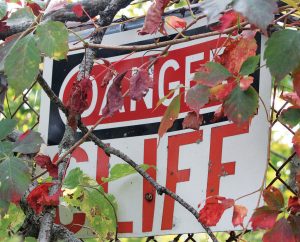BU Professor Gets Personal about Ukraine Crisis
March 29, 2022
Not being able to sleep for more than 1-2 hours a day for a week was Dr. Mykola Polyuha’s initial reaction to Russia’s invasion of Ukraine.
Dr. Polyuha, the chairperson of the language and culture department at BU, was born and raised in Western Ukraine – for Dr. Polyuha, the Ukrainian war against Russia is personal.
Dr. Polyuha spent his childhood years living in Ukraine while under Soviet communist rule. He described his childhood as “living in two realities.” One reality was the life that the Soviet Union portrayed on tv – that living under communist rule wasn’t one of hunger and desperation. In certain institutions such as school, one didn’t dare talk about the true realities of life. The true realities of life that Dr. Polyuha experienced long lines at the grocery store, waiting in line for hours for basic food items like sour cream. There was a shortage of everything – food, basic household items, and even knowledge. To purchase certain items such as clothes, one needed to know certain people – having the right connections was important.
According to Dr. Polyuha, under communist rule, Ukraine was a very closed society. Traveling outside the Soviet Union was almost impossible. Dr. Polyuha had family in Poland and for his mother to be able to visit them, she had to obtain a passport and had to be interviewed by the KGB.
As a young child, Dr. Polyhua wanted to travel the world. He recalls watching the Discovery Channel and wanting to travel to Latin America and Easter Island. He also remembers playing in the streets as a child – It wasn’t only the street in front of his house, but the entire street along with many neighboring children. “Everyone would watch,” says Dr. Polyuha. “There was less structure and more freedom, the streets weren’t filled with buses or cars, it was more of a playground than a street.”
When Mikhail Gorbachev became President of the Soviet Union during the late 1980s, it was a transition period for the country of Ukraine. The Soviet Union was loosening its communist grip. Information and knowledge were becoming more readily available and certain things that were never said too loudly were being shouted. However, the Soviet Union’s poor management of the economy resulted in extremely high inflation and the majority of the people in Ukraine saw their life savings dwindle to the amount of a loaf of bread. For years the Ukrainian people would “pretend to work [and] pretend to get paid.” It was made clear that the Soviet Union under communist rule could not provide basic necessities – for example dishwashers for its people. Finally in 1991, Ukraine achieved independence from the Soviet Union.
Ukrainians are fighting a war against Russia. They are fighting to preserve their country and the independence they enjoy. However, for Russia it is not a war, but a “special operation.” The Russian invasion is far greater than merely the invasion of one country. Russia’s invasion of Ukraine symbolizes an attack against NATO expansion and an attack against the United States. Russia feels threatened by the fact that Ukraine wants to join NATO and continue to move towards democracy.
Depending on one’s sex, life during war in Ukraine is very different. Women and children have, for the most part, fled the country. They are refugees now in countries such as Poland, Italy, Czechoslovakia, and recently the United States. Many no longer have homes in Ukraine; what is left is only rubbles. The want to return to their home country is great but there is nothing to return to, and many do not know how long they will have to stay abroad – for they cannot return until the war is over.
Nearly all able-bodied men have stayed behind in Ukraine to help aid in the fight against Russia. Men who are not actively fighting on the front lines aid in “territorial defense.” Territorial defense consists of several duties such as aiding the military with supplies, creating blockades, or providing humanitarian aid to those injured and homeless as a result of the war.
Dr. Polyuha has a personal stake in the Ukrainian war. Dr. Polyuha has family members in Ukraine, a first cousin and elderly aunt. Before the start of the war, Dr. Polyuha tried to convince his aunt to leave Ukraine or at least move to a less dangerous area of Ukraine, yet his aunt refused to leave.
Dr. Polyuha’s aunt’s hometown was bombed and has been occupied by Russian forces. Despite this, she was able to flee to a small isolated rural cottage development. She was able to flee with several of her neighbors also. They now live primitively – cooking on open fires with no electricity, and no running water.
To secure their cottage development, they spent 4-5 days cutting down trees and blocking the roads to the development to deter Russian tanks. Dr. Polyuha is not able to communicate with his aunt often, because she has to travel a mile for phone service and the service she does receive is poor. Managing the hardships of living without modern comforts, Dr. Polyuha’s aunt is safe.
Dr. Polyuha says it was a stressful first week after learning about the invasion, he couldn’t sleep and was glued to his phone scrolling endlessly through the news for updates. Nevertheless, Dr. Polyuha says that people get used to war, “they learn how to adapt and respond to situations. People have learned how to react to Russian bombing and take shelter when the sirens go off.”
“Watching the news is an emotional roller-coaster,” said Dr. Polyuha. “When Russian forces bomb hospitals, schools, and maternity wards it is extremely saddening.” Yet, Dr. Polyuha is hopeful. It has been a month since the war began and Ukraine is fighting back. When compared to the Ukraine military, Russia’s is 10-fold. The Ukrainian people are fighting fiercely. It is amazing what the spirit of Ukraine has accomplished fighting for their county, to maintain their independence against their mighty oppressor.



















